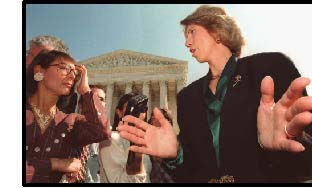

|

|

|

|
| |
|
|
|
The early reviews are in on the new George W. Bush administration. It has all the elements of the classic horror story: a predictable plot, familiar villains and an unshakable sense of déjà vu. On the following pages, we take a look at Bush's nominees and appointments, a diverse cast of characters in every way but ideology. Left to their own devices, this collection of unrepentant cold warriors, anti-choice extremists, Wise-Use desperados and corporate shills (as well as a couple of reasonable old-fashioned conservatives) could make for a harrowing next four years. Can the forces of good thwart this evil plan? Well, as In These Times went to press, thousands of townspeople were taking their torches to Washington to protest Dubya's inauguration, making one thing clear: There will be no honeymoon! Craig Aaron
James Watt in drag. That's how greens are referring to Gale Norton, George W. Bush's pick to head up the Interior Department. She certainly has got the resumé to fit the bill: She was part of the original band of "Colorado crazies" who held the Interior Department hostage under Reagan. One of Norton's first jobs was at the Mountain States Legal Center, an anti-environmental think tank based in Denver and headed by the bumbling Watt. Founded in 1977, Mountain States was lavishly underwritten by mining and energy companies as well as Joseph Coors, that faithful patron of the far right. In return, Mountain States became a training ground for the Sagebrush Rebels of the '70s and '80s, spawning the likes of Anne Gorsuch (scandal-plagued head of the Environmental Protection Agency under Reagan) and her husband, the late Bob Burford (who handed out huge concessions to the ranching and mining lobby as head of the Bureau of Land Management). Then in the '90s, Mountain States helped launch the more militant Wise-Use movement. The Mountain States agenda is fairly straightforward: attack environmental laws,
Norton's work in this far-fetched region of the law has borne fruit with a string of rulings in favor of developers from the federal bench, including a rare opinion written by Justice Clarence Thomas. Norton's forays into property rights have also inspired counties throughout the West to pass so-called "custom and culture" laws, which turn the abuse of public lands into the equivalent of a property right. The result has been predictable: a decade of environmental hostage-taking, during which developers, timber companies and miners have threatened to destroy valuable wetlands or forests unless they are paid off. Norton followed Watt to Reagan's Interior Department, where she served as deputy solicitor. She remained there even after her mentor was booted back to Colorado in disgrace. In the solicitor's office, Norton plotted to undo the Endangered Species Act, open the Arctic National Wildlife Refuge to oil companies, abet strip miners along the Rocky Mountain Front and eviscerate wetlands protection. But Norton's brand of libertarianism isn't a two-way street. She regards subsidies to individuals--be they small farmers, poor mothers or grizzly bears--as immoral. Multibillion dollar handouts to timber companies, transnational gold mining conglomerates and utilities are, for Norton, just the price of playing politics. As attorney general of Colorado, Norton could be found doing legal legwork for nearly every development scheme to hit the state. Most notably was the Amitas-La Plata project, one of the last of the big water grabs, a billion-dollar boondoggle that will destroy a river and sluice water to real estate tycoons outside Durango. She opposed any move by the feds to reserve water rights for wilderness areas or endangered fish. She was reluctant to press mining companies, which have fouled thousands of miles of Colorado streams with toxic runoff, to clean up their operations. And she trotted off to Congress to testify in favor of gutting the National Environmental Policy Act, the nation's premier environmental law. Like Attorney General-designate John Ashcroft before her, Norton also cherishes romantic notions about the Confederacy. In a 1996 speech, Norton compared her struggle to keep the EPA from enforcing tougher standards on hazardous waste and water quality in Colorado to that of the Confederacy during the Civil War. It's worth quoting at length: I recall, after I had just gone through this massive battle with the EPA on state sovereignty and states rights, visiting the East Coast. For the first time, I had the opportunity to wander through one of those Civil War graveyards. I remember seeing this column that was erected in one of those graveyards. It said in memory of all the Virginia soldiers who died in defense of the sovereignty of their state. It really took me aback. Sure, I had been filing briefs and I thought that was pretty brave. And then there were times we looked beyond the substance. When we looked at the decision-making process. And I understood the 10th Amendment was part of that separation of powers. It was part of what was supposed to guarantee that our government would remain limited. What would guarantee our freedom? Again, we certainly had bad facts in that case where we were defending state sovereignty by defending slavery. But we lost too much. We lost the idea that the states were to stand against the federal government gaining too much power over our lives. In Norton's view, the war between the states is still going on. Only this time, the battle lines are in the rural West, where a new generation of Sagebrush Rebels has taken to open and violent defiance of federal land managers and environmental laws, from carving illegal roads into endangered species habitat to planting bombs in BLM offices to threatening the lives of environmentally minded bureaucrats. Norton has attached her name to a swath of anti-environmental outfits, including the Defenders of Property Rights and the Farm Credit Property Rights Foundation. In 1998, Norton co-founded the Coalition of Republican Environmental Advocates, which she said was intended to push for "free market solutions to environmental problems." Among Norton's cohorts: Newt Gingrich, Trent Lott, Helen Chenoweth and Tom Delay. The group is funded by a who's who of mining, timber, oil and chemical companies. Greens swiftly dubbed the club Polluters Anonymous. After leaving public office, Norton joined the big Colorado law firm, Brownstein, Hyatt, Farber & Strickland, which represents some of the state's biggest polluters and developers. But Norton spent much of her time advising Bush on environmental matters during his campaign. Her theme was "responsible use" of natural resources, meaning that little, if any, public land should be set aside from industrial exploitation. Bush and Norton's transition team for the Interior Department is a grim slate of industry execs and Washington corporate lobbyists, including Bruce Benson, CEO of Benson Minerals Group, who gave Norton $183,000 in her first campaign for attorney general; Alby Modiano of the U.S. Oil and Gas Association; Henson Moore from the American Forest and Paper Association; Terry O'Connor from Arch Coal; Hal Quinn of the National Mining Association; Mark Rubin with the American Petroleum Institute; and Rob Wallace from General Electric. Also advising Norton is Terry Anderson, guru of the free-market environmental faction, who has advocated selling off all federal lands. The Sierra Club
has launched a $1 million media blitz aimed at "Borking" Norton's
nomination. But some environmentalists wonder if that's money well
spent. "Norton comes into office as sullied as Watt was when he
left," says Tim Hermach, director of the Eugene, Oregon-based Native
Forest Council. "She's already marginalized. If she withdraws,
Bush is likely to put in someone with the same philosophy but with
a gentler demeanor."
|


